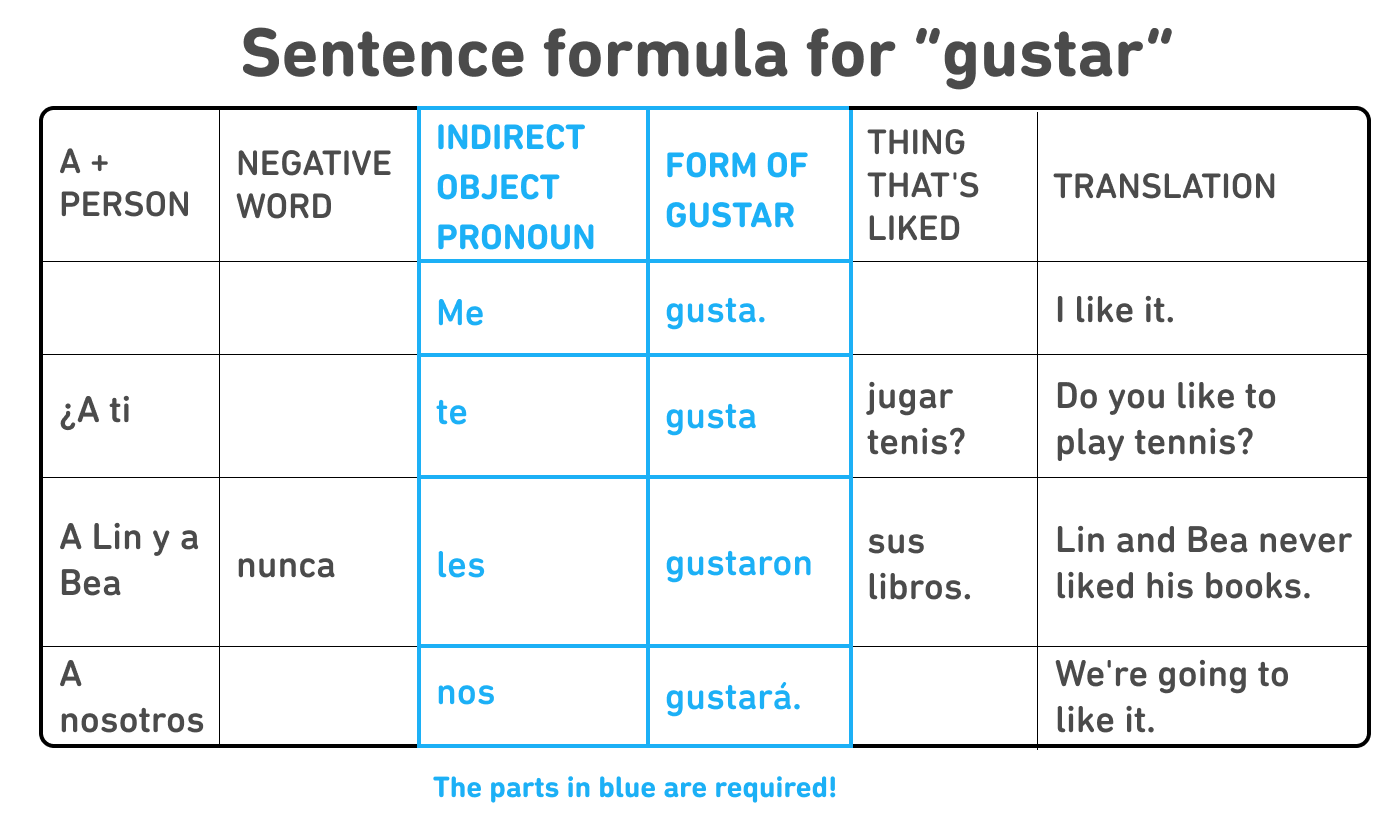Spanish learners know what they like: ¡la música, la comida y la cultura! But expressing that admiration in Spanish is another story—you need the verb gustar, which works differently than other Spanish verbs.
Here’s everything you need to know about gustar!
What does gustar mean in Spanish?
Gustar is the Spanish verb you use to express liking something:
| Spanish | English |
|---|---|
| Nos gusta viajar. | We like to travel. |
| ¿Te gustan mis zapatos? | Do you like my shoes? |
| No me gusta la pizza con piña. | I don’t like pizza with pineapple. |
While we translate gustar as “to like,” it’s used in a totally different way than in English—so be careful not to confuse its meaning with how to use it! Instead, think of gustar as having its very own grammar *structure*. Sentences with gustar follow their own word order.
So Me gusta la película means “I like the movie,” but its literal structure is more like “The movie is pleasing to me”!
How to use gustar
Gustar feels different from most Spanish verbs in 2 important ways:
- Gustar is conjugated to match the thing you like.
- You use an indirect object pronoun with gustar.
How to conjugate gustar
Like all Spanish verbs, you’ll change the ending of gustar to match the subject of the sentence. But the grammatical subject of gustar is the thing that is pleasing to you—just like the subject of The movie is pleasing to me is “the movie” and not “me”!
The subject of gustar can be either a noun or a verb. In most cases, you’ll need the third person forms of gustar: gusta and gustan.
| Form of gustar | Use it with | Example | Normal translation | Literal structure |
|---|---|---|---|---|
| gusta | singular nouns | Me gusta el té verde. | I like green tea. | Green tea is pleasing to me. |
| verbs in the infinitive | Me gusta correr en la mañana. |
I like running in the morning. | Running in the morning is pleasing to me. | |
| gustan | plural nouns | Me gustan tus aretes. | I like your earrings. | Your earrings are pleasing to me. |
It’s also possible to use other forms of gustar, for example, Me gustas tú means “I like you” (or literally, “You are pleasing to me”). For lots of practice with this form, check out Manu Chao’s song Me gustas tú—music is a great way to practice a new language! (And as with many songs, there is some mature content in Me gustas tú.)
Indirect object pronouns with gustar
In sentences with gustar, you always use the indirect object pronoun. That’s because the thing is pleasing “to” you (or him, or them, etc). Since the thing you like is pleasing to you, that’s why you’ll use an indirect object pronoun!
Here are the Spanish indirect object pronouns:
| Indirect object pronoun | Pronoun meaning |
|---|---|
| me | to me |
| te | to you |
| le | to him to her to you (formal) |
| nos | to us |
| os | to y’all (Spain only) |
| les | to them to y’all |
The sentence formula for gustar
The basic formula for using gustar is simple: indirect object pronoun + form of gustar. That means some gustar sentences are really short!
But you can add more information, too, including:
- The thing that’s liked. The noun or verb that’s liked typically goes after the verb gustar, but since Spanish has pretty flexible word order, it can also show up in other places.
- Negation. Negative words like no (no) and nunca (never) go before the indirect object pronoun.
- Who is doing the liking. You can also say more about who exactly the indirect object pronoun refers to, using the formula a + (person). This typically goes before the indirect object pronoun, but it can also appear other places.
That phrase with a + (person) is really helpful, especially if the indirect object pronoun is unclear, like with le (which has many meanings), or if you want to put emphasis on who is doing the liking. You can either include a person’s name after the a or a special prepositional object pronoun, and whichever you use, it’ll always match the indirect object pronoun:
| Phrase with a | Indirect object pronoun | Example |
|---|---|---|
| a mí | me | A mí me gusta la película. |
| a ti | te | A ti te gusta la película. |
| a él a ella a usted a Zari a mi mamá |
le | A él le gusta la película. A Zari le gusta la película. |
| a nosotros a nosotras a Eddy y a mí |
nos | A nosotros nos gusta la película. |
| a vosotros a vosotras a Lin y a ti |
os | A vosotros os gusta la película. |
| a ellos a ellas a ustedes a Lily y a Zari a mis padres |
les | A ustedes les gusta la película. A mis padres les gusta la película. |
Here is the typical sentence formula for gustar:

Other Spanish verbs that work like gustar
Gustar isn’t the only Spanish verb that behaves this way! Here are a few more you’re likely to encounter:
Encantar (to love something)
¡Me encanta tu estilo! (I love your style!)
Nos encantó el concierto. (We loved the concert.)
A Junior le encanta el helado. (Junior loves ice cream.)
Emocionar (to be excited about something)
Les emocionan sus nuevos TikToks. (They’re excited about his new TikToks.)
La verdad es que no me emociona mucho. (The truth is that I’m not really excited about it.)
Te emocionaron las noticias de la compañía, ¿no? (You were excited about the company’s news, weren’t you?)
Interesar (to be interested in something)
A Oscar le interesa el vino. (Oscar is interested in wine.)
¿Les interesa nadar con los delfines? (Are y’all interested in swimming with the dolphins?)
Me interesaría aprender muchos idiomas. (I’d be interested in learning many languages.)
Molesetar (to be bothered by)
¿No te molestan las moscas? (Are the flies not bothering you? / You’re not bothered by the flies?)
A mí me molesta mucho su actitud. (His attitude really bothers me. / I’m really bothered by his attitude.)
A él le molesta ir de compras, pero es su responsabilidad. (He doesn’t like going shopping, but it’s his responsibility.)
¡Nos gusta el verbo gustar!
Gustar works differently from other Spanish verbs, but its basic structure is simple! Use the gustar sentence formula to learn the most important parts of gustar sentences first and then practice adding more information when you’re ready.
